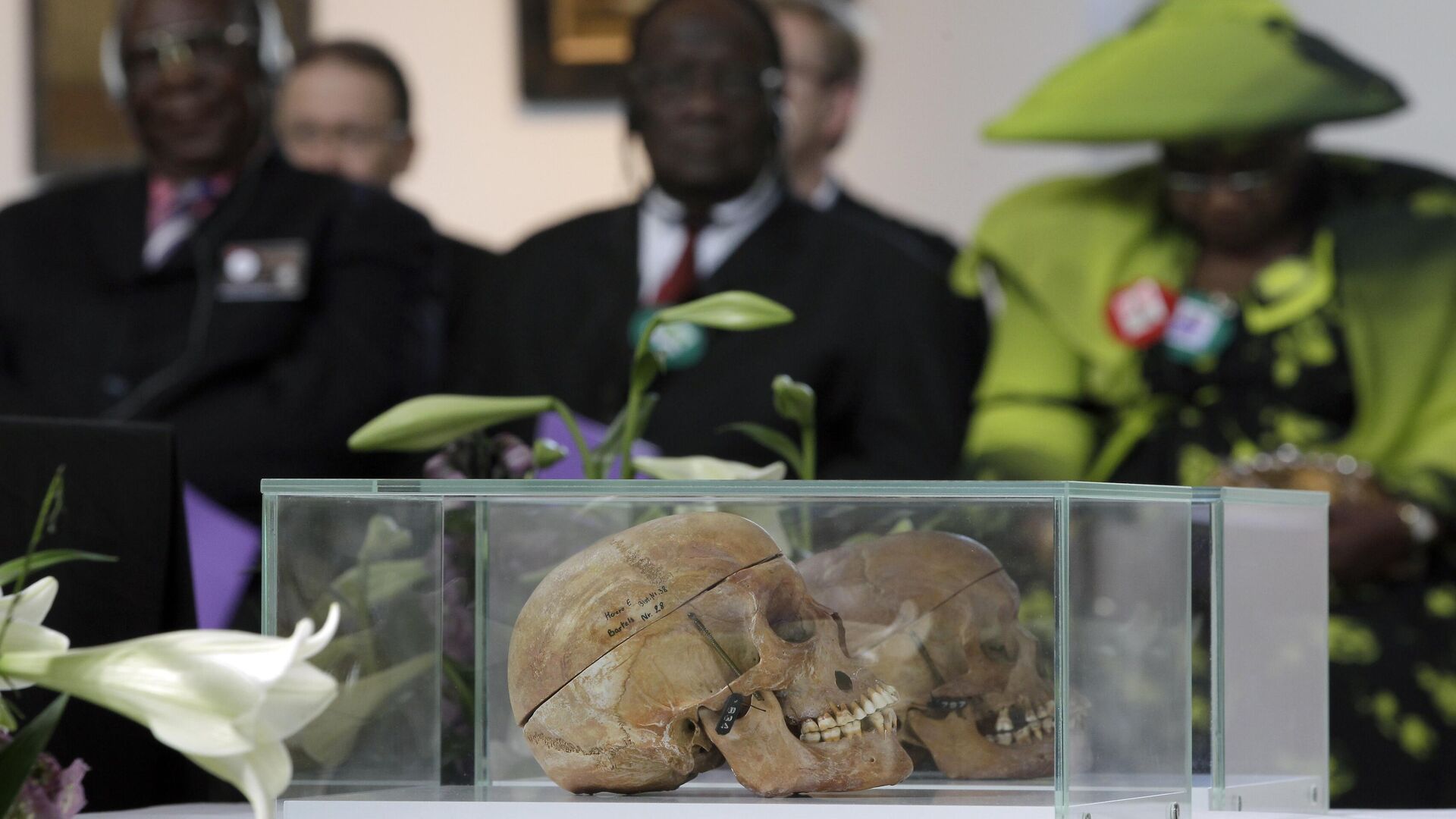https://en.sputniknews.africa/20240116/rooted-in-lived-experience-why-namibia-objects-to-german-support-for-israel-in-icj-case-1064641365.html
Rooted in 'Lived Experience': Why Namibia Objects to German Support for Israel in ICJ Case
Rooted in 'Lived Experience': Why Namibia Objects to German Support for Israel in ICJ Case
Sputnik Africa
On Sunday, Namibia condemned Germany's decision to reject genocide charges against Israel at the ICJ. Namibia, where the first genocide of the 20th century... 16.01.2024, Sputnik Africa
2024-01-16T14:04+0100
2024-01-16T14:04+0100
2024-01-16T14:04+0100
namibia
gaza
germany
international court of justice (icj)
south africa
southern africa
genocide
colonialism
neocolonialism
israeli-palestinian conflict
https://cdn1.img.sputniknews.africa/img/07e8/01/10/1064641862_0:130:3409:2047_1920x0_80_0_0_1da69a29c29584dc4adbc7432ae1b48e.jpg
Namibia's condemnation of Germany's rejection of South Africa's "genocide" accusations against Israel at the International Court of Justice (ICJ) is rooted in the traumatic experience of the Namibian people, who were victims of the first recorded genocide of the 20th century under German colonial rule, Dr. Rasigan Maharajh, chief director of the Institute for Economic Research and Innovation at the Tshwane University of Technology in South Africa, told Sputnik Africa.Highlighting Germany's historical responsibility for the genocide perpetrated against the Namibia's Herero and Nama communities between 1904 and 1908, Dr. Maharajh said that the majority of people around the world find it difficult to understand Berlin's current stance on the ongoing humanitarian crisis in the besieged Palestinian Gaza Strip, where Israeli attacks have killed more than 24,000 civilians, according to the enclave's authorities.Reflecting on Germany's acknowledgement of colonial atrocities in Namibia, Dr. Maharajh underscored the broader issue of reconciliation and restitution. He emphasized the historical background of the colonial occupation of the southwestern part of southern Africa, where 824,000 km² of land was purchased by the German merchant family Luderitz for about "770 British pounds" and subsequently secured under German imperial protection.The South African academic highlighted the grim historical parallels, pointing to a chilling 1904 statement by a German general detailing brutal and horrifying instructions for the Herero people.Dr. Maharajh urged recognition and acknowledgement of past atrocities. He emphasized the critical importance for the German society to not only acknowledge the injustices of the past, but also to acknowledge and address current conflicts such as those in "occupied Palestine as present."The expert went on to explore the particularities of German colonial rule and its enduring legacy on the Namibian people, urging a critical examination of historical injustices and their contemporary implications.He highlighted the brutal imposition of settler colonialism that led to the forced expulsion and extermination of the indigenous population, evoking echoes of historical tragedy that continue to the present day.In a comprehensive assessment of the long-term effects of German colonial rule in Namibia, Maharajh underscored the enduring effects of settler colonialism and exploitation that persisted well beyond the end of direct German occupation. The systematic theft of natural resources, particularly diamonds, underpinned economic exploitation and perpetuated underdevelopment and inequality for decades.He highlighted the key role played by international solidarity, particularly from the people of Cuba, in catalyzing Namibia's liberation of in the early 1990s, enabling the nation to manage its own development and chart a new trajectory.
https://en.sputniknews.africa/20240114/namibia-condemns-former-colonial-power-germany-over-gaza-response-1064610729.html
https://en.sputniknews.africa/20240115/south-africas-position-in-icj-case-against-israel-is-very-strong-palestinian-minister-1064623938.html
namibia
gaza
germany
south africa
southern africa
palestine
israel
Sputnik Africa
feedback@sputniknews.com
+74956456601
MIA „Rossiya Segodnya“
2024
Muhammad Nooh Osman
https://cdn1.img.sputniknews.africa/img/07e7/04/0a/1058467512_0:0:1280:1280_100x100_80_0_0_ec723833bcbfcaed2e21952965ad99e4.jpg
Muhammad Nooh Osman
https://cdn1.img.sputniknews.africa/img/07e7/04/0a/1058467512_0:0:1280:1280_100x100_80_0_0_ec723833bcbfcaed2e21952965ad99e4.jpg
News
en_EN
Sputnik Africa
feedback@sputniknews.com
+74956456601
MIA „Rossiya Segodnya“
Sputnik Africa
feedback@sputniknews.com
+74956456601
MIA „Rossiya Segodnya“
Muhammad Nooh Osman
https://cdn1.img.sputniknews.africa/img/07e7/04/0a/1058467512_0:0:1280:1280_100x100_80_0_0_ec723833bcbfcaed2e21952965ad99e4.jpg
namibia, gaza, germany, international court of justice (icj), south africa, southern africa, genocide, colonialism, neocolonialism, israeli-palestinian conflict, palestine, israel, international
namibia, gaza, germany, international court of justice (icj), south africa, southern africa, genocide, colonialism, neocolonialism, israeli-palestinian conflict, palestine, israel, international
Rooted in 'Lived Experience': Why Namibia Objects to German Support for Israel in ICJ Case
Muhammad Nooh Osman
Writer/Editor
On Sunday, Namibia condemned Germany's decision to reject genocide charges against Israel at the ICJ. Namibia, where the first genocide of the 20th century took place under German colonial rule, accused Berlin of "ignoring" the "deaths of over 23,000 Palestinians in Gaza" and defending "the genocidal and gruesome acts of the Israeli government."
Namibia's condemnation of Germany's rejection of South Africa's
"genocide" accusations against Israel at the International Court of Justice (ICJ) is rooted in the traumatic experience of the Namibian people, who were victims of the first recorded genocide of the 20th century under German colonial rule,
Dr. Rasigan Maharajh, chief director of the Institute for Economic Research and Innovation at the Tshwane University of Technology in South Africa, told
Sputnik Africa.
Highlighting Germany's historical responsibility for the genocide perpetrated against the Namibia's Herero and Nama communities between 1904 and 1908, Dr. Maharajh said that the majority of people around the world find it difficult to understand Berlin's current stance on the ongoing humanitarian crisis in the besieged Palestinian Gaza Strip, where Israeli attacks have killed more than 24,000 civilians, according to the enclave's authorities.
"This does not represent the German society, but actually merely articulates the position of the German elite and the political class that controls their society," the expert said. "Why Namibia objects so correctly to Germany's position, is because of the lived experience of the Namibians under circumstances where genocide may have been practiced."
Reflecting on Germany's acknowledgement of colonial atrocities in Namibia, Dr. Maharajh underscored the broader issue of reconciliation and restitution. He emphasized the historical background of the colonial occupation of the southwestern part of southern Africa, where 824,000 km² of land was purchased by the German merchant family Luderitz for about "770 British pounds" and subsequently secured under German imperial protection.
The South African academic highlighted the grim historical parallels, pointing to a chilling 1904 statement by a German general detailing brutal and horrifying instructions for the Herero people.
"This was a statement issued by a German general on the 2nd of October in 1904. And he says: 'The Herero are no longer German subjects. They have murdered and plundered. Now, out of cowardice, they want to give up the fight. The Herero nation must leave the country. If it will not do so, I shall compel it by force inside German territory. Every Herero tribesmen, armed or unarmed, with or without cattle, will be shot,'" Dr. Maharajh narrated.
Dr. Maharajh urged
recognition and acknowledgement of past atrocities. He emphasized the critical importance for the German society to not only acknowledge the injustices of the past, but also to acknowledge and address current conflicts such as those in "occupied Palestine as present."
The expert went on to explore the particularities of German colonial rule and its enduring legacy on the Namibian people, urging a critical examination of
historical injustices and their contemporary implications.
He highlighted the brutal imposition of settler colonialism that led to the forced expulsion and extermination of the indigenous population, evoking echoes of historical tragedy that continue to the present day.
"Germans experimented with people and established concentration camps through which people were exterminated, not only exterminated, but also became the victims of medical experimentation, amongst other issues, and this was seen to contribute basically to the scientific arguments for German racial superiority. And it's important that we recognize this lays the basis for the fascism that we would see thereafter."
Dr. Rasigan Maharajh,
Chief director of the Institute for Economic Research and Innovation at the Tshwane University of Technology in South Africa
In a comprehensive assessment of the long-term effects of German colonial rule in Namibia, Maharajh underscored the enduring effects of settler colonialism and exploitation that persisted well beyond the end of direct German occupation. The systematic theft of natural resources, particularly diamonds, underpinned economic exploitation and perpetuated underdevelopment and inequality for decades.
He highlighted the key role played by international solidarity, particularly from the people of Cuba, in catalyzing Namibia's liberation of in the early 1990s, enabling the nation to manage its own development and chart a new trajectory.
"It cannot be that history repeats itself then as tragedy, then as farce. And now we continue to see this being perpetuated," Dr. Maharajh stated. "The 21st century cannot continue along such barbarisms of the past."




